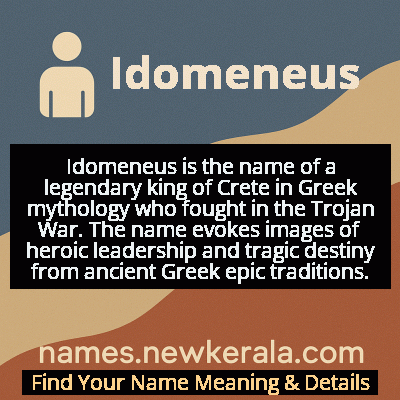Idomeneus Name Meaning & Details
Origin, Popularity, Numerology Analysis & Name Meaning of Idomeneus
Discover the origin, meaning, and cultural significance of the name IDOMENEUS. Delve into its historical roots and explore the lasting impact it has had on communities and traditions.
Name
Idomeneus
Gender
Male
Origin
Greek
Lucky Number
6
Meaning of the Name - Idomeneus
Idomeneus is the name of a legendary king of Crete in Greek mythology who fought in the Trojan War. The name evokes images of heroic leadership and tragic destiny from ancient Greek epic traditions.
Idomeneus - Complete Numerology Analysis
Your Numerology Number
Based on Pythagorean Numerology System
Ruling Planet
Venus
Positive Nature
Harmonious, responsible, caring, and artistic.
Negative Traits
Overly idealistic, superficial, possessive, or jealous.
Lucky Colours
Pink, turquoise.
Lucky Days
Friday.
Lucky Stones
Diamond, turquoise.
Harmony Numbers
2, 3, 9.
Best Suited Professions
Artists, musicians, teachers, healthcare workers.
What People Like About You
Warmth, nurturing nature, artistic flair.
Famous People Named Idomeneus
Idomeneus of Crete
Mythological King/Warrior
Led the Cretan forces in the Trojan War and was one of the heroes hidden in the Trojan Horse
Idomeneus (Historical Figure)
Ancient Greek Writer
Wrote about Socrates and was mentioned by Plato and Diogenes Laërtius
Idomeneus (Literary Character)
Operatic Character
Title character in Mozart's opera 'Idomeneo, re di Creta' (1781)
Name Variations & International Equivalents
Click on blue names to explore their detailed meanings. Gray names with will be available soon.
Cultural & Historical Significance
The post-Homeric tradition enriched his story with the dramatic episode of his vow to Poseidon during a storm at sea, promising to sacrifice whatever he first encountered upon safe return to Crete. When this turned out to be his own son, the resulting tragedy became a powerful cultural narrative about the consequences of rash promises and the conflict between religious duty and familial love. This story has resonated through centuries of Western art and literature, most significantly in Mozart's opera 'Idomeneo,' which transformed the ancient myth into a profound exploration of human suffering and redemption. The enduring cultural relevance of Idomeneus lies in his embodiment of the classical hero who must navigate impossible choices between competing sacred obligations.
Extended Personality Analysis
The name Idomeneus evokes personality traits rooted in classical heroism—courage, strategic intelligence, and unwavering commitment to one's word. Those bearing this name are often perceived as natural leaders who combine martial prowess with thoughtful deliberation, capable of inspiring loyalty through both their battlefield achievements and their principled conduct. The mythological Idomeneus demonstrates exceptional loyalty to his allies and a fierce determination that makes him one of the most respected Greek commanders at Troy, qualities that would be associated with anyone carrying his name.
However, the tragic dimensions of Idomeneus's story also suggest personality complexities including a tendency toward impulsive decisions made under extreme pressure and a struggle with the consequences of such choices. The name carries connotations of someone who bears heavy responsibilities with dignity but may be haunted by the costs of leadership. This combination of heroic virtue and human vulnerability creates a rich psychological profile—someone who commands respect through capability and integrity while remaining profoundly aware of the moral complexities inherent in power and promise-keeping. The personality associated with Idomeneus ultimately represents the classical ideal of the complete leader: brave in conflict, loyal to comrades, but ultimately human in their vulnerabilities.
Modern Usage & Popularity
In contemporary naming practices, Idomeneus remains an extraordinarily rare choice, primarily confined to Greece and classical scholarship circles. The name has never entered mainstream usage in any country and does not appear in modern baby name databases or popularity charts. Its current employment is largely academic or artistic, with occasional use in Greek families deeply connected to their mythological heritage. The complexity and weight of the name, combined with its association with a tragic mythological narrative, have prevented widespread adoption. However, it maintains a presence in cultural contexts through continued performances of Mozart's 'Idomeneo' and scholarly discussions of Homeric epic, ensuring that while it may not be a common given name, it remains part of the living classical tradition in educated circles.
Symbolic & Spiritual Meanings
Symbolically, Idomeneus represents the eternal conflict between human ambition and divine will, serving as a metaphor for the limitations of mortal power in the face of cosmic forces. His story symbolizes the heavy price of leadership and the unforeseen consequences of promises made in desperation. The name embodies the classical Greek understanding of tragedy—where noble qualities and good intentions can lead to catastrophic outcomes through the intervention of fate or the gods. Idomeneus stands as a symbolic figure of the warrior-king whose very strengths become the instruments of his suffering, representing the idea that human excellence cannot always overcome the larger forces that govern existence. His narrative serves as an enduring symbolic warning about the dangers of absolute vows and the complex relationship between personal honor and human compassion.

